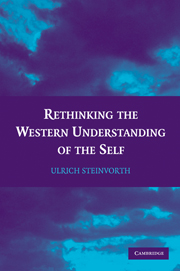Book contents
- Frontmatter
- Contents
- Preface
- Part I Introduction
- Part II Basics of Philosophical Psychology
- Part III The Cartesian Self in History
- Chapter 6 The Cause and Content of Modernity
- Chapter 7 The Second-Stage Rationality in History
- Chapter 8 Economic Rationality
- Chapter 9 The Cartesian Self in the Twentieth Century
- Part IV Value Spheres
- Part V A Self-Understanding Not Only for the West
- Select Bibliography
- Index
Chapter 6 - The Cause and Content of Modernity
Published online by Cambridge University Press: 05 June 2012
- Frontmatter
- Contents
- Preface
- Part I Introduction
- Part II Basics of Philosophical Psychology
- Part III The Cartesian Self in History
- Chapter 6 The Cause and Content of Modernity
- Chapter 7 The Second-Stage Rationality in History
- Chapter 8 Economic Rationality
- Chapter 9 The Cartesian Self in the Twentieth Century
- Part IV Value Spheres
- Part V A Self-Understanding Not Only for the West
- Select Bibliography
- Index
Summary
One root of western civilization is the civilization of the Greeks of the fifth and fourth centuries BC. They started science, politics, and a form of rationality that have become models for the West. Nonetheless, ancient Greece is not the West. What distinguishes them is the idea that science, politics, and rationality are forms of activities that are open to and binding for everyone. For Plato and Aristotle, reason in its full active form was a capacity owned only by male Greeks; its lack in the barbarians entitled the Greeks to enslave them. For them, mankind was divided in natural masters and natural slaves. What distinguishes the West or modernity (which I identify) from ancient Greece is its belief in the unity of mankind, the universality of reason, and the equal rights of everyone to decide on their life.
There is no sharp borderline between antiquity and modernity. We find the modern view already in Cicero and the Stoic philosophers he drew on, perhaps even earlier, and the West is full of theorists and politicians who tacitly or openly reject the idea of universal reason. However, this idea prevails in and defines the West, just as the idea of a natural split of mankind into masters and slaves prevailed in and defined antiquity.
So when we search for an explanation for how modernity could arise at all, the first question is how the idea of universality of reason could arise.
- Type
- Chapter
- Information
- Rethinking the Western Understanding of the Self , pp. 61 - 70Publisher: Cambridge University PressPrint publication year: 2009

